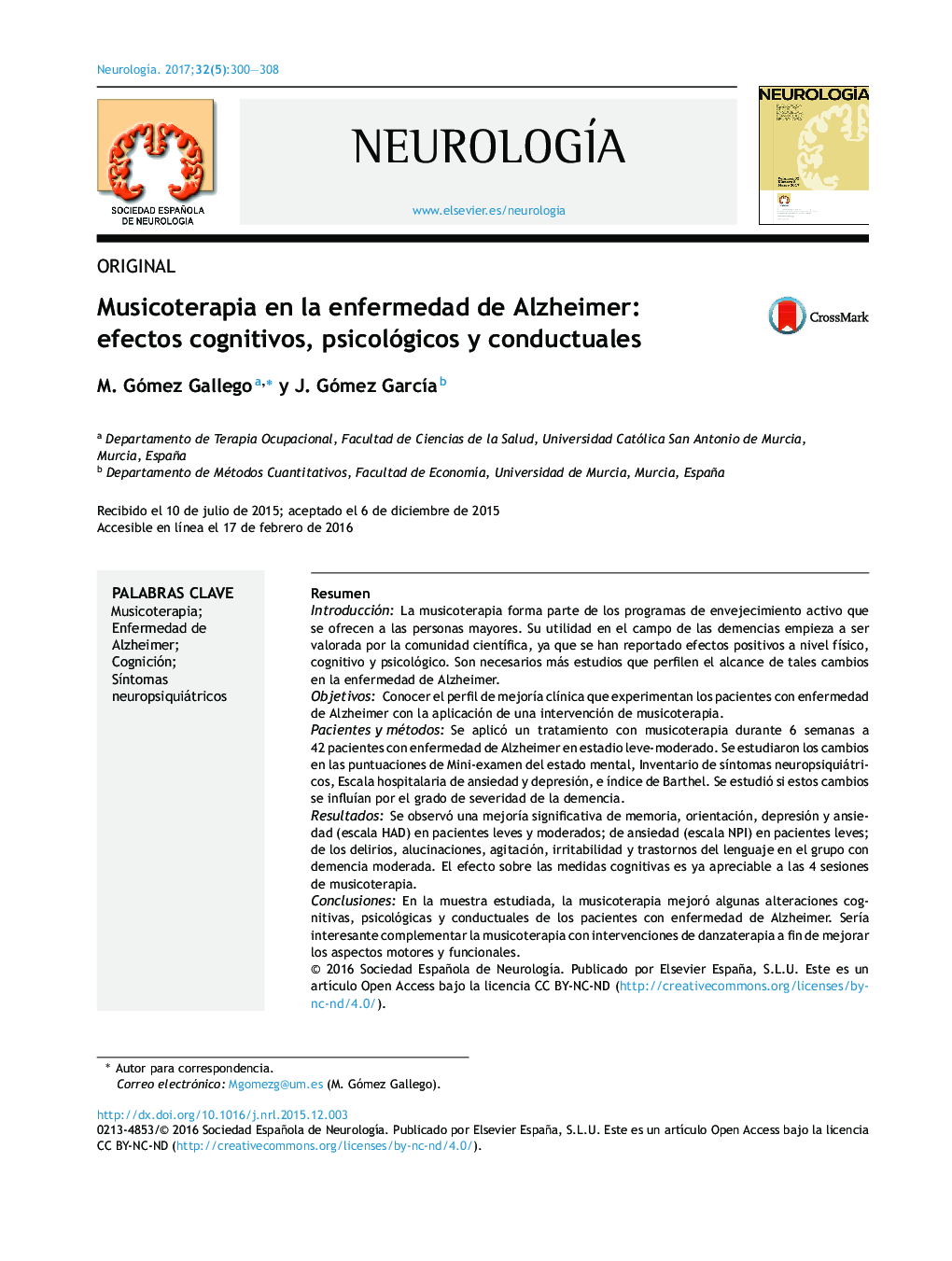| Article ID | Journal | Published Year | Pages | File Type |
|---|---|---|---|---|
| 5631786 | Neurología | 2017 | 9 Pages |
ResumenIntroducciónLa musicoterapia forma parte de los programas de envejecimiento activo que se ofrecen a las personas mayores. Su utilidad en el campo de las demencias empieza a ser valorada por la comunidad cientÃfica, ya que se han reportado efectos positivos a nivel fÃsico, cognitivo y psicológico. Son necesarios más estudios que perfilen el alcance de tales cambios en la enfermedad de Alzheimer.ObjetivosConocer el perfil de mejorÃa clÃnica que experimentan los pacientes con enfermedad de Alzheimer con la aplicación de una intervención de musicoterapia.Pacientes y métodosSe aplicó un tratamiento con musicoterapia durante 6 semanas a 42 pacientes con enfermedad de Alzheimer en estadio leve-moderado. Se estudiaron los cambios en las puntuaciones de Mini-examen del estado mental, Inventario de sÃntomas neuropsiquiátricos, Escala hospitalaria de ansiedad y depresión, e Ãndice de Barthel. Se estudió si estos cambios se influÃan por el grado de severidad de la demencia.ResultadosSe observó una mejorÃa significativa de memoria, orientación, depresión y ansiedad (escala HAD) en pacientes leves y moderados; de ansiedad (escala NPI) en pacientes leves; de los delirios, alucinaciones, agitación, irritabilidad y trastornos del lenguaje en el grupo con demencia moderada. El efecto sobre las medidas cognitivas es ya apreciable a las 4 sesiones de musicoterapia.ConclusionesEn la muestra estudiada, la musicoterapia mejoró algunas alteraciones cognitivas, psicológicas y conductuales de los pacientes con enfermedad de Alzheimer. SerÃa interesante complementar la musicoterapia con intervenciones de danzaterapia a fin de mejorar los aspectos motores y funcionales.
IntroductionMusic therapy is one of the types of active ageing programmes which are offered to elderly people. The usefulness of this programme in the field of dementia is beginning to be recognised by the scientific community, since studies have reported physical, cognitive, and psychological benefits. Further studies detailing the changes resulting from the use of music therapy with Alzheimer patients are needed.ObjectivesDetermine the clinical improvement profile of Alzheimer patients who have undergone music therapy.Patients and methodsForty-two patients with mild to moderate Alzheimer disease underwent music therapy for 6 weeks. The changes in results on the Mini-mental State Examination, Neuropsychiatric Inventory, Hospital Anxiety and Depression Scale and Barthel Index scores were studied. We also analysed whether or not these changes were influenced by the degree of dementia severity.ResultsSignificant improvement was observed in memory, orientation, depression and anxiety (HAD scale) in both mild and moderate cases; in anxiety (NPI scale) in mild cases; and in delirium, hallucinations, agitation, irritability, and language disorders in the group with moderate Alzheimer disease. The effect on cognitive measures was appreciable after only 4 music therapy sessions.ConclusionsIn the sample studied, music therapy improved some cognitive, psychological, and behavioural alterations in patients with Alzheimer disease. Combining music therapy with dance therapy to improve motor and functional impairment would be an interesting line of research.
